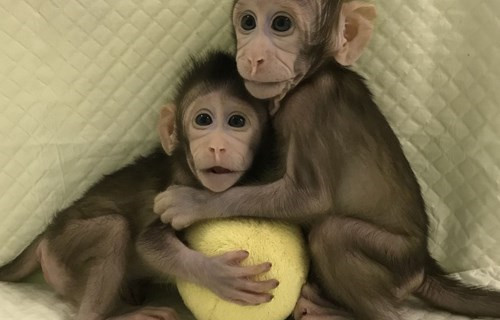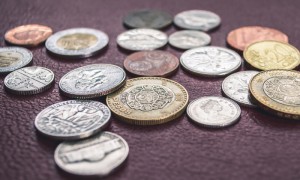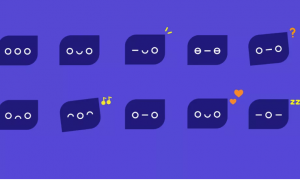1月25日,中科院神经科学研究所团队宣布完成世界首例体细胞克隆猴,分别叫“中中”和“华华”。它们的“故事”登上了国际权威学术期刊《细胞》封面,这意味着中国科学家成功突破了现有技术无法克隆灵长类动物的世界难题。

China became the first country to clone a monkey using non-reproductive cells, reducing the need to breed lab monkeys and paving the way for more accurate, effective, and affordable animal tests for new drugs, scientists said on Thursday.
周二有关学者宣布,中国成为首个用体细胞成功克隆猴子的国家,此举减少了对试验猴品种的需求,并且为新药品动物测试更高效、方便及精确奠定了基础。
By December, the Institute of Neuroscience of the Chinese Academy of Sciences had created two clone macaques named "Zhong Zhong" and "Hua Hua" by nuclear transferring of somatic cells -- any cell in the organism other than reproductive cells. this was the similar technology used to create the famous clone sheep Dolly in 1996.
到去年12月,中科院神经科学研究所通过体细胞核移植,使得“中中”和“华华”的两只克隆短尾猴诞生。体细胞是器官里生殖细胞以外的任何细胞。这项科学技术和1996年用于克隆羊多莉类似。
Tetra, a rhesus monkey born in 1999, is the world’s first ever-cloned monkey, but it was done using a simpler method called embryo splitting, but it could only generate four cloned offspring at a time and cannot be genetically modified to suit experimental needs, said Pu Muming, an academician at the Chinese Academy of Sciences and the director of Institute of Neuroscience, CAS.
中国科学院院士、中国科学院神经科学研究所所长蒲慕明称,1999年出生的猕猴Tetra是世界上第一只克隆猴,但这是通过一种更简单的叫胚胎分割的方式实现的,这种方式一次只能产生四个克隆后代,且无法进行基因改造来满足实验需求。
Cloning a monkey using somatic cells has been a world-class challenge because it is a primate that shares its genetic makeup, therefore all of its complexity, with humans, he said.
他说:“由于猴子是灵长类动物与人类的基因相似,其复杂性也相似,因此采用体细胞克隆猴子一直是一项世界级的挑战。”
For drug and other lab tests, scientists have to purchase monkeys from all over the world, which is costly, bad for the environment and produces inaccurate results because each monkey might have different genes, Pu said.
蒲说,为了研发药物和其他实验测试,科学家们不得不满世界买猴子,这样不仅成本高,对环境不利,并且由于这些买来的猴子基因不同,从而使得测试结果也不精确。
By cloning monkey using somatic cells, we can mass cultivate large number of genetically identical offspring in a short amount of time, and we can even change their genes to suit our needs, he added. "This can save time, cut down experiment costs, and produce more accurate results, leading to more effective medicine."
他补充道,通过体细胞克隆猴子,我们可以在短期内大规模培养出相同基因的后代,并且甚至根据我们的要求来改变他们的基因。此举可节省时间,降低试验费用,并且可以使结果更精确,带来更高效的药物。
Sun Qiang, director of the non-human primate research facility at the institute, said most of the drug trials are currently done on lab mice. However, drugs that work on mice might not work or even have severe side effects on humans because the two species are so different.
研究所非人灵长类目研究部门负责人孙强表示,目前,大多数药物测试都是通过实验鼠完成。然而,作用于老鼠的药物未必作用人类,或甚至有严重的副作用,因为两大物种差异巨大。
Monkeys and Humans are both primates, so they are much closely related and testing on Monkeys is supposed to be as effective as testing on humans, he said. This is especially useful in testing drugs for neural diseases such as Parkinson’s disease, metabolic and immune system disease, and tumor, he added.
他表示,“猴与人都是灵长类动物,所以他们关系密切,对猴有效的测试应该同样适用于人类。”他补充说道,此举对于帕金斯、代谢及免疫系统疾病等神经疾病和肿瘤的药物测试帮助巨大。
This achievement will help China lead the world research in an international science projects related to neural mapping of primate brains, he said. However, bio labs from the United States, Japan, and European countries are also very capable, and they will quickly catch up to China after the monkey cloning technology is made public, Sun added.
“这一成就有助于中国在关于灵长类动物大脑的神经反射的国际科学项目领域占据领导地位。”孙补充说道,然而,美、日及欧洲国家生物实验室能力也很强,在猴克隆技术公开后,这些国家也会快速的赶上中国。
This means we have to innovate continuously and work extra harder this year to stay ahead, he said.
因此孙表示:“这也意味着我们必须不断创新,在这方面需做出比今年更大的努力来保持世界领先水平。”







